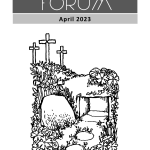Thought for the Week – 2nd April 2023
The Scandal of the cross
And so, after the 40 days of Lent, we enter Holy Week. Depending on your spirituality, a week of deep devotion culminating in the joy of the Resurrection, or a celebration of Hot Cross Buns and chocolate Easter Eggs. Some of us manage to hold both aspects together. Perhaps it is significant that it has been easier to secularise Easter Sunday, with a popular symbol that has only a tenuous connection with the Christian story of resurrection compared to Good Friday; Hot X Buns anyone? The cross remains in popular culture a symbol of Christianity. Not all are comfortable with this. The journalist and a vice-president of Humanists UK, Polly Toynbee questions “Why wear the symbol of a barbaric torture?” But the cross persists, as a symbol of hope and kindness.
Polly Toynbee’s bafflement at the cross is as old as Christianity. St Paul, probably writing just over 30 years after the crucifixion spoke of how the cross was foolishness to the opponents of Christianity; Christ crucified was a stumbling block to Jews and folly to the non-Jews. The Greek word that is often translated as “stumbling block” is “skandalon”, from which we get “scandal”. It is actually derived from the word for a trigger of a trap, that would catch its victim by the leg. However you look at it, it seemed at best bizarre to Paul’s contemporaries that an instrument of execution could become the tool of a God who works and wins by love. But Paul understood; the foolishness of God destroys the wisdom of humankind, the weakness of a God who rules from a cross is stronger than all the powers of humanity and darkness. That is why I wear the symbol of a barbaric torture.
Rev David Poyner
Highley Forum – April 2023
Thought for the Week – 26th March 2023
Suffering and The Passion
As a vicar, people sometimes share experiences with me. These can be times of joy but sometimes they are much bleaker moments. I have recently had a number of those. It can be hard to know what to say, perhaps no words can be said; it is just enough to listen and be with the person in the pain. An equal challenge is what I then say to myself afterwards, as I reflect on what I have heard and hold it against my faith in a God who is love, a God who is trustworthy and in whom there is nothing but love.
This tension is as old as religious experience. The Bible and Christian thought give no easy answers. However, I can draw some pointers from those passages, especially in the Old Testament, where writers wrestle with the same dilemma that I face and throw the problem and their anger back to God, with a recognition that God also somehow feels their pain. This reaches its conclusion in the New Testament with Jesus, God who takes human form and suffers pain and death in our human world. This Sunday is Passion Sunday, when the church especially remembers this. Much scholarly energy has been spent on discussing what it means to say that God shares in suffering and if, how that helps; all I can say is that I stand alongside the mother I heard reflecting on the death of her handicapped daughter and who said “I can only worship a god who shares in suffering”.
Rev David Poyner
Thought for the Week – 19th March 2023
The Enduring Power of Mothering Sunday
This Sunday is Mothering Sunday. It is a strange mixture of religious and secular; a Sunday that has its origins in the Middle Ages as a celebration of the Church as a mother to all her had been admitted to her by baptism. More specifically, it was a time to visit the church in which the individual had been baptised; this was a person’s mother church. It was celebrated half-way through Lent, an excuse for some festivities and eating during a period when most would be expected to fast. By the seventeenth century the focus had shifted, now it was a day when those in service, either in houses or on farms, were given a day off to visit their mothers. The tradition of simnel cake and savoury buns comes from the Gospel reading for this day, where Jesus feeds the 5000 with a few loaves and fish. Mothering Sunday may have passed into the backwaters where we now find Rogation and Lammas tide, if it were not for developments in the United States, where Anna Jarvis had campaigned for a day to celebrate mothers. This inspired Constance Penswick Smith in this country to re-establish Mothering Sunday as a specifically Christian (initially Anglican) celebration of the role of mothers in Christian families. Thus in our very secular world, we still buy cards and flowers to send on what was once “Refreshment Sunday” in Lent.
On Sunday, I will be at Glazeley, where my mother was baptised; in my prayers I will give thanks for the love that I had from both Mum and Dad, the people from whom I learnt what love is. In our environmentally conscious times some now also see the day as a time to give thanks for fruitfulness of “mother” earth; Mothering Sunday is wonderfully adaptable. And I will join with others in celebrating all those who are mothers or act as mothers, through good times and bad; the times as children we love them, the times we find that less easy. They remain our mothers, the people who brought us into the world.
Rev David Poyner
Thought for the Week – 12th March 2023
Religion and Politicians
Tony Blair, now a practicing Roman Catholic, was always very coy about expressing his religious views whilst still in politics; possibly Kate Forbes, one of the contenders for the leadership of the Scottish National Party may be wishing she had taken his lead. She is a member of the Free Church of Scotland, a church which keeps strictly to what it considers as Biblical teaching on social issues. She made it known that she supported its line and promptly found herself pilloried by those who only a few hours before had supported her, even though she made it clear that these were personal views and she would not use her position to impose them on others. Interestingly, as I write this, she seems back in contention for the job of leader, with significant backing from ordinary party members.
My theology, from the liberal wing of the Church of England, is not that of the Free Church; I disagree with some of the views of Ms Forbes. However, I do worry that some of the reaction against her is a symptom of a culture that treats faith as at best a private eccentricity, to be kept hidden and incompatible with modern society. It is beyond me how a politician who has religious faith cannot draw on that faith to shape their political views, be they right or left wing. I do hope that we have not reached the point where those who hold political office cannot talk openly about their religious views and how these influence their core beliefs. If that is the case, I fear the country will be the poorer and I worry about the policies that will result.
Rev David Poyner

